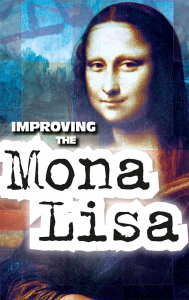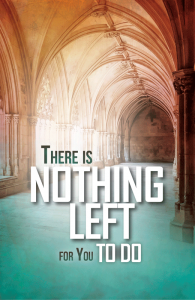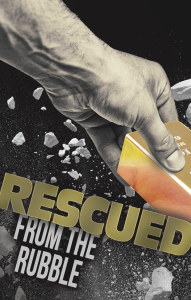 himself on being an atheist, wrote to the editor of a newspaper:
himself on being an atheist, wrote to the editor of a newspaper:
Sir, I have been trying an experiment. I have a field of corn which I plowed on Sunday, I planted it on Sunday, I did the cultivating on Sunday, I gathered the crop on Sunday, and on Sunday I hauled it into my barn. And I find that I have more corn per acre than has been gathered by any of my neighbors during this October.
The farmer’s sneer is obvious. By deliberately choosing to do all the work connected with his cornfield on the Lord’s Day, he had challenged God to express disapproval by giving him a disappointing result. Instead, he had reaped an exceptionally good crop.
But the editor of the paper drew attention to one overlooked fact in a footnote:
God does not always settle His accounts in October.
This helps explain the present prosperity of many who defy the holy Word of God. The truth is that the present world and the life of the individual on earth aren’t adequate for the display of divine righteousness. God does not always settle His accounts in October!
He sometimes meets sin with His obvious displeasure and gives those who obey Him a quick reward for their faithfulness. But this is by no means always the case. The conclusion to draw is, not that God is indifferent to sin and that His government of men is a sham, but that the reckoning day is future.
The Scriptures give repeated testimony that a judgment day is coming when “God shall bring every work into judgment, with every secret thing, whether it be good, or whether it be evil” (Ecclesiastes 12:14). Every seeming injustice will be set right, “so that a man shall say, Verily, there is a reward for the righteous: verily He is a God that judgeth in the earth” (Psalm 58:11).
I am not assuming that, like the farmer, you have any wish to challenge or defy God. But does the judgment day scare you? Remember, there will be no mercy but strict justice. Sins that demand punishment will then certainly be punished.
God must and will judge your sins. Does this concern you? Are you prepared to face God’s just judgment and punishment for them?
God offers you an alternate. In love He sent His Son into the world, so that He could take your place and be punished for your sins. He offers His Son as your substitute. He came and died for you. He suffered to pay for the sins of each one who trusts in Him as their Saviour. Have you accepted Him as your substitute? If you have, you no longer face judgment.
What good news! How good to know that God has acted. He has Himself provided the needed sacrifice and has dealt with our sins on the ground of it. The only way to personally benefit from God’s plan is to receive it by faith in Christ as applicable in all its glorious results to oneself. “He that believeth on the Son hath everlasting life” (John 3:36). And such a one will never come into judgment.
Other than this great redemption plan, there is no hope for anyone. Sooner or later every unrepentant sinner will be broken by God. The settling day will come.
God “hath appointed a day, in the which He will judge the world in righteousness” (Acts 17:31).
 people use someone else for their own personal pleasure. When that pleasure is gone, they move on to someone else. A colleague of mine always used to nervously straighten up and apply her make-up before going home to her husband. She feared him leaving her — again — and wanted to pass his inspection. It wasn’t enough; he moved out for another woman. Have you felt that pain of rejection from a parent, friend or spouse? Do you have to hide part of who you are to be acceptable to others?
people use someone else for their own personal pleasure. When that pleasure is gone, they move on to someone else. A colleague of mine always used to nervously straighten up and apply her make-up before going home to her husband. She feared him leaving her — again — and wanted to pass his inspection. It wasn’t enough; he moved out for another woman. Have you felt that pain of rejection from a parent, friend or spouse? Do you have to hide part of who you are to be acceptable to others?
 a train leaving Quebec. After taking my seat in a crowded coach, a Roman Catholic priest sat down beside me. It wasn’t long before he noticed a small Bible case which I carried, and he asked me if I were a businessman.
a train leaving Quebec. After taking my seat in a crowded coach, a Roman Catholic priest sat down beside me. It wasn’t long before he noticed a small Bible case which I carried, and he asked me if I were a businessman. young mother in San Francisco made her doctor swear he would keep her secret. He would never reveal her name to anyone who came asking about the child he’d just delivered. But about thirty years later he was dying and the secret burned in him. He sat down to write a letter. The doctor finished his letter and then died with it still on his desk.
young mother in San Francisco made her doctor swear he would keep her secret. He would never reveal her name to anyone who came asking about the child he’d just delivered. But about thirty years later he was dying and the secret burned in him. He sat down to write a letter. The doctor finished his letter and then died with it still on his desk.
 be your favorite work of art, but it would be hard to find a more famous or imitated piece. Painted in approximately 1504 by Leonardo da Vinci, the Mona Lisa has had a pretty unique journey.
be your favorite work of art, but it would be hard to find a more famous or imitated piece. Painted in approximately 1504 by Leonardo da Vinci, the Mona Lisa has had a pretty unique journey.
 was raised in religion, but he was notorious for his pursuit of pleasure. However, like you and me, he had both a memory and a conscience.
was raised in religion, but he was notorious for his pursuit of pleasure. However, like you and me, he had both a memory and a conscience.
 lived in Greece a ruler named Archias. A very selfish man, he lived only for pleasure and cared little or nothing for the needs of his people. Many hated him, and at last some plotted together to kill him.
lived in Greece a ruler named Archias. A very selfish man, he lived only for pleasure and cared little or nothing for the needs of his people. Many hated him, and at last some plotted together to kill him.
 nothing — nothing at all. That’s what you brought into the world with you when you were born. Just nothing … zero.
nothing — nothing at all. That’s what you brought into the world with you when you were born. Just nothing … zero.
 products of the renovation project in the bathroom. But staring out from underneath it all was a small glistening object. Turns out the plumber in Calgary, Alberta, had uncovered a heavy $50,000 gold bar the size of a cell phone. It had the jeweler’s stamp on it as well as its serial number. The owners were thrilled, of course.
products of the renovation project in the bathroom. But staring out from underneath it all was a small glistening object. Turns out the plumber in Calgary, Alberta, had uncovered a heavy $50,000 gold bar the size of a cell phone. It had the jeweler’s stamp on it as well as its serial number. The owners were thrilled, of course.